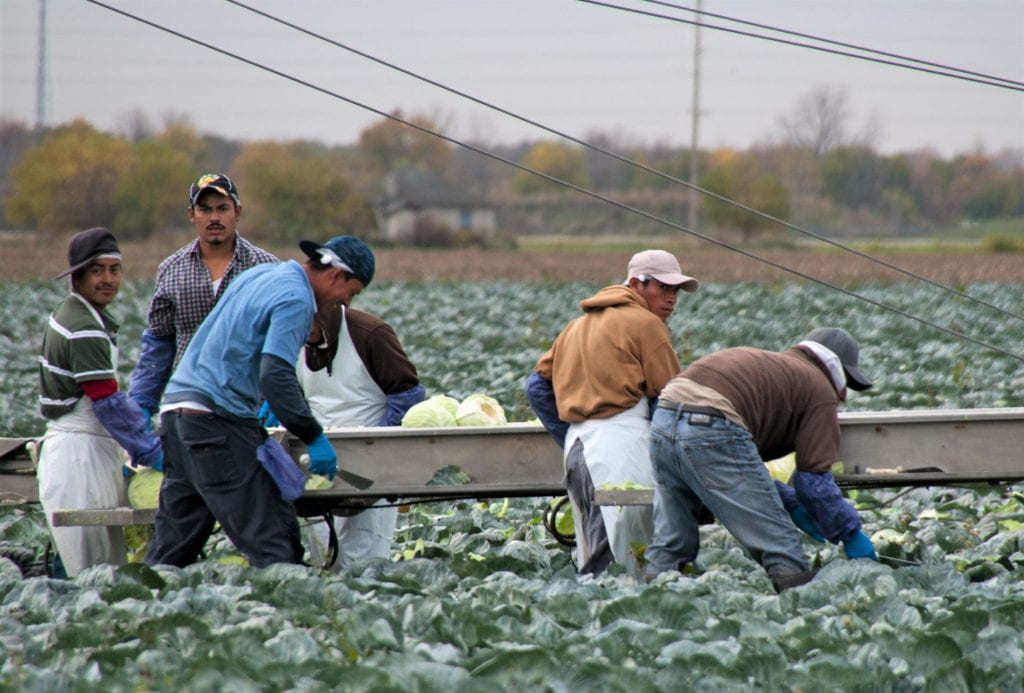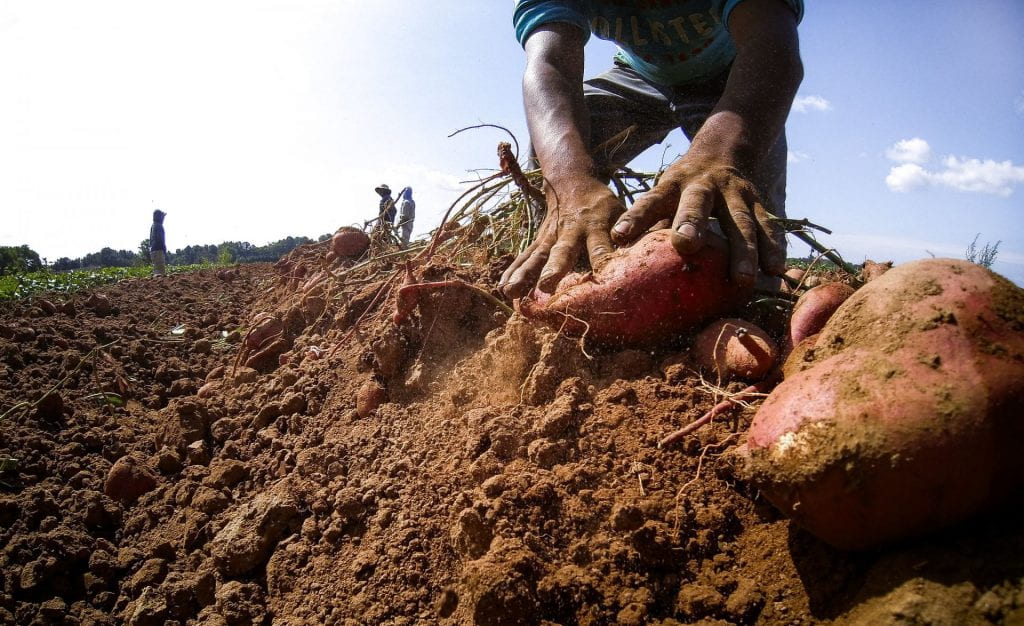By Manoj Dias-Abey.
In July I co-organised a webinar on the situation of migrant farmworkers with Tomaso Ferrando (University of Antwerp) and Brid Brennan (Transnational Institute). We wanted to explore how the working and living conditions of migrant farmworkers during the COVID-19 pandemic merely represented a more acute form of marginalisation experienced in so-called normal times. We also wanted to speculate about how their situation might shift in the near future and what this would mean for labour organising efforts.
Rather than holding a discussion between academic interlocutors, we invited five farmworker advocates to reflect on these issues. We did so, first, because these advocates were likely to have a more accurate appraisal of the situation on the ground. And, second, because, having pioneered insightful analyses of the food system and effective forms of activism, advocates might also be able to explain how farmworkers could organise to raise their plight from the margins to the centre of national consciousness. The webinar featured Alagie Jinkang from IKENGA in Italy, Bridget Henderson from UNITE in the UK, Gerardo Reyes Chavez from the Coalition of Immokalee Workers in Florida, US, Vasanthi Venkatesh from Justice for Migrant Workers in Ontario, Canada, and Carlos Marentes from the North American division of La Via Campesina.

Despite the different country contexts, the advocates told a depressingly similar tale of overcrowded living conditions, long working hours, little or no safety precautions including safety adaptations for COVID, and barely enough pay to meet basic living costs. Large outbreaks of COVID have been detected in Ontario, Florida and Herefordshire, and these are simply the ones that have been reported. The lockdown measures have, in some cases, made the situation worse for workers, with one advocate describing it as being ‘locked in marginalised spaces’, lacking necessary ‘conveniences’ such as electricity and plumbing. Advocates reported that government agencies responsible for testing the population and implementing public safety measures were rarely seen or entirely invisible. The migrant workers keenly felt that their lives were disposable even as governments were taking unprecedented steps to protect the lives and livelihoods of citizens.
Several of the advocates were quick to point out that COVID did not create these conditions, but simply exacerbated existing forms of marginalisation and inequality. In each of the countries surveyed in the webinar, migrant farmworkers are some of the worst paid workers in the labour force. They work under enormously precarious conditions, particularly so in the case of seasonal farmworkers. The work is difficult and dangerous and the hours long and arduous. Supervisors treat workers with contempt and forms of racial discrimination and sexual harassment are rife. The rural setting of farms contributes to workers’ sense of isolation from sympathetic populations and critical services.
The poor working and living conditions of migrant farmworkers are widely recognised as a function of a food system organised along the axes of market distribution and capital accumulation. Several of the advocates highlighted the role of value chains in particular, which have come to dominate agricultural production. Large, global supermarkets sit at the top of these chains, exercising power and control over growers to provide produce that meets strict product specifications at low costs. In addition, successive rounds of trade liberalisation have created a situation in which most countries are now dependent on food imports. During the pandemic, interruption of the passage of agricultural products across borders and the disruption of food value chains have caused foods shortages and price spikes, and raised the prospect of mass hunger as the pandemic inexorably spreads. These dynamics diminish the room available for growers to provide decent working conditions.

In each of the countries considered in the webinar, the farm labour force tends to be predominantly made up of migrants. A variety of legal frameworks are used to mobilise workers across borders and immobilise them in the workplace. In Canada, for instance, guestworker programmes bring in tens of thousands of seasonal farmworkers from Mexico and the Caribbean to work on fruit and vegetable farms. Since they are required to be employed by a particular employer as a condition of their visa, and changing employers is almost impossible, employers wield enormous power over these workers. In the US and Italy, a significant portion of the farmworker population lacks the proper legal authorisation to work. This means that the workers are vulnerable to deportation by state agencies, which inhibits any resistance to exploitative working conditions.
In the UK, a seasonal agricultural programme has been recently launched and expanded to replace the migrant workforce previously provided by free movement under European Union rules. In each of the jurisdictions, de jure and de facto restrictions on collective bargaining along with weak employment standards and poor government enforcement further constrain farmworkers’ capacity to act, adding to their marginalisation.
It is striking that even as countries closed their borders to travel due to the pandemic, migrant farmworkers were allowed entry on the basis of their importance to food production. How do we resolve the apparent paradox between the essentialness of agriculture and farm work, but legal frameworks that treat workers as ‘eminently disposable commodities’? In fact, there is no paradox at all. Whilst many were initially hopeful that the discourse of ‘essential work’ would operate to revalorise occupations such as farm labour, it is increasingly clear that the narrative merely affirms that this work needs to be performed regardless of the consequences for individual workers and their families. If anything, public declarations deeming particular sectors essential have simply reinforced the notion that some workers’ lives are cheap.
The difficult task of revaluing work will require political struggle and the organisations represented at the webinar had a variety of different strategies for achieving this outcome. Bridget Henderson spoke of the challenges faced by traditional trade unions to organise a transient workforce to engage in collective bargaining in the UK. Alagie Jinkang and Vasanthi Venkatesh represent organisations that have taken a different path. By engaging in community building and forms of direct action such as wildcat strikes, these organisations have won very specific gains, although their strategies have not resulted in a broader transformation of the situation faced by farmworkers.
Gerardo Reyes Chavez described the private governance regime established by the Coalition of Immokalee Workers, in which lead firms such as supermarkets and fast food companies were enlisted to purchase their produce from growers with non-exploitative employment practices. Although this programme has had remarkable success in improving working conditions of tomato harvesters in Florida, and there is some evidence of it being used as model elsewhere, a range of contingent factors will affect whether it can be more broadly replicated. Given the global nature of the food system today, transnational conversations between advocates and farmworkers will be necessary to inspire and coordinate a response.
A recording of the webinar is available here. A podcast is available here.

